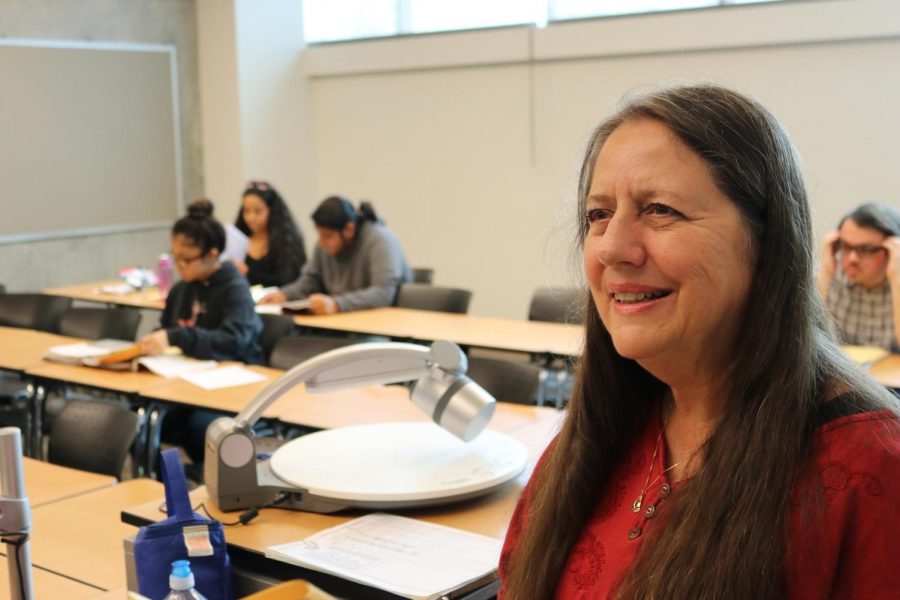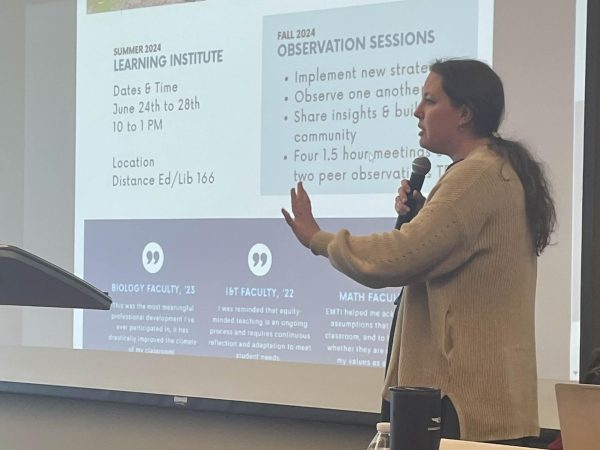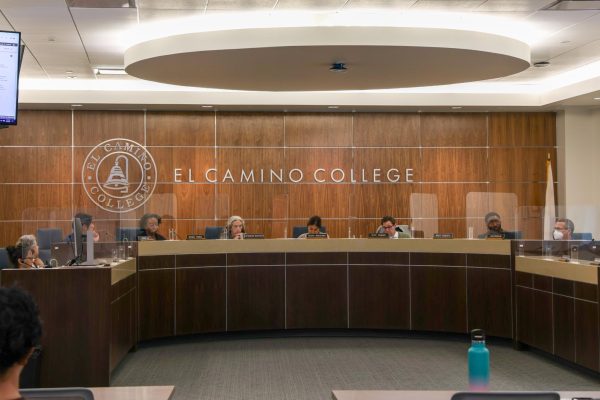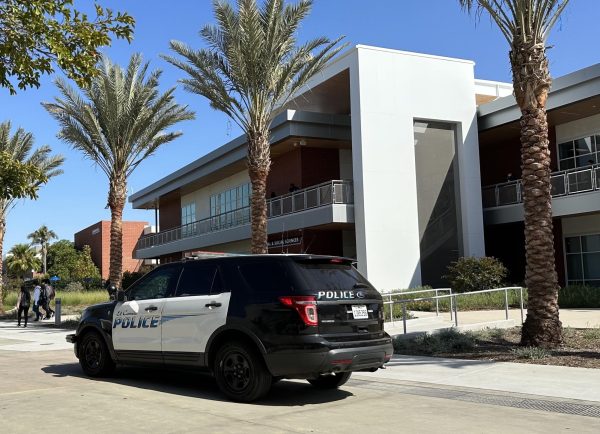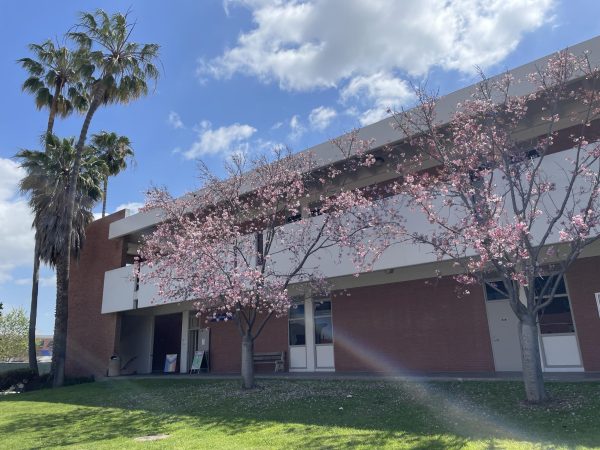Remedial classes will be affected by new statewide law
Update: 11:05 a.m. Wednesday, Dec. 12. Correction in paragraph four, the option to take other lower-level English courses might not be available to students.
Students huddle outside a classroom on the second floor of the Humanities Building minutes before their English 82 course is about to start.
Nervously chatting with each other about the upcoming exam, their professor arrives on time and greets her students as she opens the door.
It is a normal day, but simply one of many in a year that has been “a little scary” for part-time professor Nancilyn Burruss, she said.
Despite being a part-time instructor at El Camino College for almost 15 years, she will not have a job teaching lower-level English courses in fall 2019; by then, her students might not have the option to take other lower-level English courses as the number of courses will be decreased.
In October of 2017, California State Legislature passed AB 705, which requires community colleges to allow students in fall 2019 to take transfer-level English and math courses, which begin at English 1A and Mathematics 110, depending on high school coursework and GPA.
Furthermore, “a community college district or college shall not require students to enroll in remedial English or mathematics coursework that lengthens their time to complete a degree,” according to AB 705.
California Assemblywoman Jacqui Irwin, who authored AB 705, said the bill was first considered when she was approached by Campaign for College Opportunity, a nonprofit policy and research organization, that presented areas in which community colleges could be improved.
When she first saw the bill, Irwin said she “thought that this could be really a game changer.”
“What they saw with a couple of pilot programs that were being run, if students get placed in higher level courses with support, the outcomes are much better,” Irwin said.
Although the bill received unanimous support in the California Legislature given the data behind the legislation and its prospects in shortening the years students spend at community colleges, often due to remedial courses, some opposition to implementing the new law has arisen, Irwin said.
“The skepticism is putting students directly into transfer-level classes when they’re not prepared might lead to more students just dropping out,” Irwin said. “It is a hard conversation and there are definitely people on both sides of the issue.”
Through the process of implementing AB 705, professors need to be listened to and given the support they require, she said.
“It’s a done deal at this point but it continues to be a difficult conversation as everything is revamped,” California Assemblywoman Jacqui Irwin said.
“This legislation is based on pilot programs that have been done but we need to make sure that we follow the progress and that we’re achieving the goals that we’ve set out to achieve,” Irwin said.
El Camino Administration Prepares for Changes
Vice President of Academic Affairs Jean Shankweiler said placement in remedial courses keeps students from graduating on time.
“Research shows that they really don’t need to be there; they can be taking English 1A and Math 150,” Shankweiler said. “So less time taking classes they don’t need, that’s the main benefit.”
Associate Dean of the Mathematical Sciences Department Marlow Lemons said enrollment in transfer-level classes will rise due to students’ new eligibility and will result in faculty teaching transfer-level courses instead of remedial ones.
However, courses one notch below transfer-level will still be offered in the fall 2019 semester as optional courses for students who would rather have an extra semester of preparation, Lemons added.
This includes Mathematics 80 for math and Integrated Reading and Writing Enhanced (RWE) for English.
EC President Dena Maloney, who was “encouraged by the research,” said for students who take semesters of remedial courses in order to take transfer-level courses, “their persistence suffers because there’s a long road ahead to get to the end goal.”
“The research shows that students that are placed directly into transfer-level English and math typically on average are more successful in completing the courses and moving on the pathway they’ve chosen for their degree or certificate,” Maloney said.
Courses that will be affected, by either not being offered or have a considerable reduction in sections offered, during the fall 2019 semester include English A, B, 80 82, and 84 and Mathematics 12, 23, 37, 40, 67, 73, and 80.
Student Reaction to AB 705
Although EC is mandated to allow students to take transfer-level courses by fall 2019, students will be able to “level up” and enroll in at least English 1A and Mathematics 110 as soon as spring 2019.
EC has released surveys and begun reaching out to students to help them find out where they place in accordance with GPA and the most recent classes they have taken, Lemons said.
Second-year EC student Kevin Yniguez supports AB 705 because “it would be a better transition to be taking a class that’s more related to something you had most recently.”
In high school, he remembers last taking Trigonometry as a senior and having over a 3.0 GPA. When he entered EC in fall 2017, he did not try to his fullest extent on the placement test, ending up in remedial English and math courses.
“I didn’t really study for the [placement] test and that’s my fault,” he said. “Because of the way the test is structured, I was placed in a class that I didn’t need to be in.”
Now in his third semester at EC, Yniguez is taking transfer-level English 1C and remedial Mathematics 40; he could have started in transfer-level classes instead of having to take remedial English courses, he said.
“I feel like the test negatively affected me because it’s kind of basing your future off of one piece of paper,” Yniguez said.
Conversely, first-year student Natalie Tovar said she “feel[s] very conflicted about” AB 705.
While it may benefit some, Tovar still thinks “it might hold them back maybe because they might not have gotten all the help that they could have gotten from that class.”
Tovar, who will take English 1A next semester, is currently taking remedial English A which has helped her progress and feel more confident in writing, she said.
Also a first-year student in remedial English A, Kelly Parra said AB 705 “is something good.”
“It’s going to be a great opportunity for everybody that perhaps scored lower,” first-year student in remedial English A, Kelly Parra said.
“They won’t have to take all those classes,” Parra said. “They’ll be saving more money and time.”
Although Parra has benefited from English A in terms of writing techniques and preparation for transfer-level English 1A, she still thinks that new AB 705 changes are for the better although it is dependent on the student in every case, she said.
“It depends because not everybody learns the same so some people might need to take more time,” Parra said. “But some people might not, they might feel like they’re ready for it.”
Professors adjust to AB 705
The minimum qualifications to teach remedial courses differ from requirements to teach transfer-level English courses; professors who do not have the minimum qualifications to teach transfer-level English courses will be affected, Dean of the Humanities Department Debra Breckheimer said.
“We are fortunate enough it didn’t affect too many adjunct instructors,” Breckheimer said. “It did not affect any of our full-time faculty.”
Options for part-time instructors who do not meet minimum qualifications to teach transfer-level English courses include going back to school to gain necessary credentials or looking for another job.
Breckheimer said the Humanities Department has been “very open and transparent” of these minimum qualifications “driven by the Chancellor’s Office.”
She also “made recommendations on departments that [affected] professors can reach out to,” she said.
This issue is not present in the Mathematical Sciences Department, as all math professors are “flexible” to teach a range of mathematical courses; none of them will have to attain further education to teach transfer-level math courses, Lemons said.
Professors who teach remedial courses will instead teach transfer-level courses since a large amount of lower-level course sections will not be available next fall and students will be anticipated to enroll in more transfer-level courses, Lemons said.
The few part-time English professors affected by AB 705, which Breckheimer said are “fewer than five,” include Burruss, who first began as a part-time instructor at EC in 2004 and has since taught a multitude of development courses in English including English 82 and 84.
Her Master’s Degree in Education does not fulfill the requirements for teaching transfer-level English courses.
“My dean called me in last week and told me I wouldn’t have classes in the fall,” Burruss said.
Breckheimer refused to disclose information regarding part-time instructors and said she felt uncomfortable discussing personal matters in the newspaper.
With Burruss “less than five years from retiring,” her options are limited, she said.
“To go and take upper division coursework of 12 to 18 units and start with the cost of college and fees and studying for a part-time job which I may or may not get a class—it’s ridiculous.”
Burruss said she will be looking other places for employment to pay her monthly expenses, one of which includes a “$2,000 a month medical insurance bill.”
“I’ll be filing for unemployment come June,” Burruss said.
Update: 11:25 a.m. Wednesday, Dec. 12. A sentence added in error was removed for clarity.


